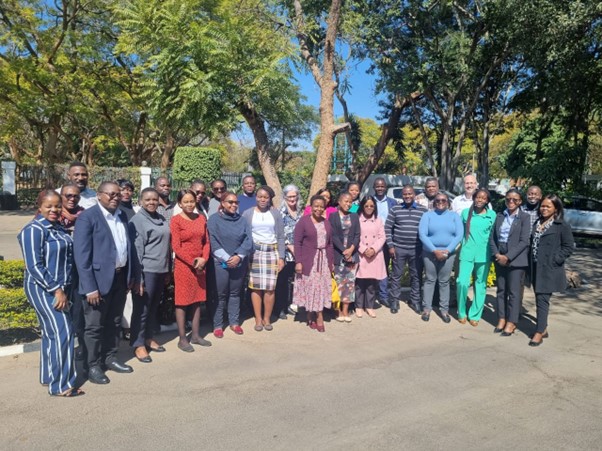
The UK Health Security Agency (UKHSA) International Health Regulations Strengthening Project (IHR-SP) is providing ongoing support to Zambia's Ministry of Health (MOH) to increase local and regional capacity to perform laboratory accreditation assessments for the Southern African Development Community Accreditation Services (SADCAS).
This initiative addresses a critical gap in Zambia's public health infrastructure. Since 2010, Zambia has introduced systems to improve the quality and reliability of its laboratory services using Quality Management Systems (QMS). A well-established QMS should lead to accreditation of laboratories from an independent national body. However, only 26 of 534 operational laboratories in Zambia have achieved formal accreditation. Progress has been slow based on several factors including dependence on external assessors and prohibitive costs.
SADCAS provides crucial accreditation services to 13 SADC member countries, including Zambia, that currently do not have national accreditation bodies. The organisation also ensures accreditation providers meet international standards that are vital for health protection and environmental safety.
Building local expertise for regional impact
In a step toward sustainable laboratory quality systems in Zambia and Southern Africa, Zambia’s MOH requested that UKHSA facilitate the training of 24 new SADCAS assessors by providing logistical and advisory support. This initiative aimed to equip local professionals to conduct assessments required for accreditation of medical laboratories to internationally recognised standards (ISO 15189 assessments), both locally and across SADCAS member states.
The initiative of training local SADCAS assessors for Zambia aimed to achieve three interconnected goals.
The first objective supports the establishment of Zambia's own National Accreditation Body to ensure sustainable compliance with QMS standards in public health laboratories. This directly responds to Zambia’s 2023 Joint External Evaluation (JEE), which identified establishing a national laboratory accreditation body as a priority action for enhanced compliance and mandatory licensing of laboratories enforcement.
The second goal focuses on reducing costs and strengthening local and regional self-sufficiency by developing in-country expertise. This supports the MOH’s target to accredit twenty additional laboratories, including the Zambia National Public Health Reference Laboratory (ZNPHRL) by 2027.
Finally, the programme builds local capacity to independently assess and accredit laboratories participating in Zambia’s laboratory quality programmes, including the National QMS Certification Programme, Strengthening Laboratory Management Towards Accreditation, Microbiology mentorship teams, and National-Multi Pathogen Diagnostic Programme.
Training approach
Participants were carefully selected based on their active involvement with and knowledge of ISO 15189: 2022 Medical Laboratories: Requirements and Competence.
The training, delivered by SADCAS experts, provided an overview of changes and requirements in the ISO 15189:2022 standard compared to the previous ISO 15189:2012 version. Core training areas covered the entire span of an assessment, from preparation and planning, conducting the assessment and preparing post-assessment reports and follow-up actions. Within this process, participants also gained knowledge of the key SADCAS and ISO documents used by an assessor, as well as the expected professional ethical conduct expected of a SADCAS assessor.
In addition to logistical support from IHR-SP, this collaborative effort includes support from the Centre for Infectious Disease Research in Zambia-Trials (CIDRZ-Trials) and US Centres for Disease Control and Prevention (US CDC), who assisted with the registration of the legal framework for the accreditation body.

Image above: trainee SADCAS assessors
Post training
As part of SADCAS requirement for certification, participants must demonstrate competency by participating in at least three field activities after the initial theoretical training which took place in October 2024. In the first field training in November 2024, trainee assessors observed SADCAS expert assessors conduct assessments on accredited laboratories in Zambia. The second field training in February 2025 saw trainee assessors conduct assessments under SADCAS expert supervision at laboratories transitioning from ISO 15189: 2012 to ISO 15189: 2022.
A third assessment visit is planned for later this year to complete the trainees’ certification requirements. This comprehensive approach ensures the trainees develop practical expertise alongside theoretical knowledge, creating a foundation for sustainable, locally led laboratory accreditation across the region.
Useful Resources
Related Articles
-
From vision to action: Sindh’s IDSR Lab Network Review marks key progress in Pakistan’s IDSR journey
BY Dr Muhammad Sartaj -
Gilgit-Baltistan launches new laboratory network in efforts to strengthen Integrated Disease Surveillance and Response across Pakistan
BY Dr Muhammad Sartaj, Sumera Abid -
Nigeria’s National Reference Laboratory achieves international accreditation
BY Olubunmi Negedu-Momoh -
Proactive preparedness: Ethiopia establishes VHF detection capacity ahead of regional need
BY Leanne Devine, hiwothailu -
From Nigeria to The Gambia: IHR-SP advances cross-sectoral leadership in public health
BY Paul Irabor
Please Sign in (or Register) to view further.